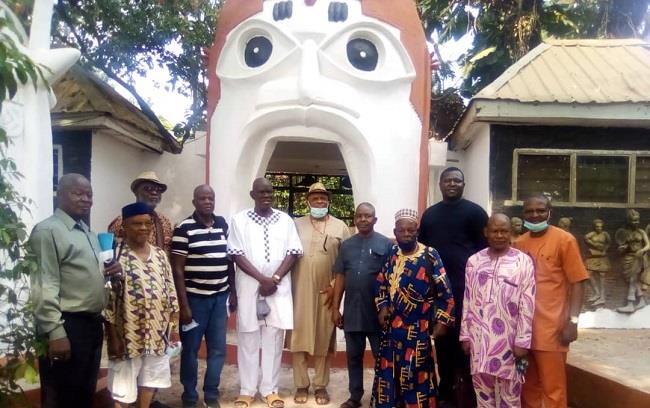Advocating or acting for the protection and preservation of the environment and wildlife is a vigorous passion which conservationists, worldwide, are well known to endure or carry on with. Being a conservationist, a name for an enforcer of nature’s conservancy principles, the writer of this article could tell the long mileage lovers of nature usually could go in protecting the very things of nature that they so much adore.

And in some foreign cultures, it is often awe-inspiring seeing the sincerity of purpose in which nature advocates or activists attach to the environment and the diverse life-supports, therein.
But, when conservationists in the Nigeria’s clime choose to congregate as “Conservation Roundtable” assembly, it as well suggests that the same subtlety global principles of nature conservation are a prod of the group, which enlists a multi-stakeholder of shared conservation groups and individuals.
Having debuted in Benin City, the capital of Edo State, Nigeria, recently, the “Conservation Roundtable” wishes to bind and swing for nature conservation in the country, and to swivel purposeful environmental ideals, for the desired effects of sustaining nature for a life-in-continuity for the Nigerian people.
Remarkably, the “Conservation Roundtable” amalgam had apparently kick- started whirly in the right footing, thus enlisting notable and committed conservationists, who would in turn attract others into the fold. The group is the child brain of Andy Ehanire, a frontline conservationist, Park’s Management Consultant and Ecotourism Expert and Tony Erha, a conservationist and journalist, who had popularised environmental reporting in Nigeria and beyond.
In a painstaking choice for an ideal fertile soil for sowing and nurturing the conservation nicety of the “Conservation Roundtable”, the Ebohon Cultural Centre, Benin City, came handy, not only because of what the centre represents as a globally acclaimed conservation enclave per excellence, but that its Founder/Custodian, the High Priest Osemwegie Ebohon, is himself a nature conservation protagonist, who has taken environmental practice and messages to the nook and cranny of the world, as have not been done by any African in human memory, in recent times.
In recognition of his unrivalled nature’s propagation, worldwide, High Priest Ebohon had received numerous global honours, including the “One Million Miller Status”, a globalised award for those who have travelled farthest by airplanes for such humanitarian activities.
Other founding members of the group, who graced the inaugural event, included Ako Obobaifo, head of the Institute for Benin Studies, a historical and cultural institution, set up in memory of the late historian and curator, Dr. Joseph Egharevba. Pa Alfred Ohenhen, a naturalist who had contributed immensely to biodiversity protection and generational transfer of traditional conservation knowledge, and Justin Imoudu, a veteran journalist, are among.
Others include Prof Omon Ojior, a United States of America-based nature activist, Ologun Biodun Freeman and Ujih Ogagwu, who are both conservation experts, and Edward Ogba.
Also attended by journalists, full deliberations of the talks as delivered by the High Priest Ebohon, Ehanire, Erha, Pa Ohenhen, Obobaifo and Prof Ojior et al were mirrored in the event’s communiqué that was signed by Andy Ehanire, its Convener.
Rather than being confrontational, as conservationists are generally known to be, across the globe, in the courses of mitigating against incessant violations of the environment, the “Conservation Roundtable” says it opts for “subtle measures”, even though environmental violations often demand aggressive mitigating responses.
The conferees deemed it appropriate for Nigeria to settle for “subtle measures” in the public’s approach, hence environmental awareness and citizenry’s adaptation to the ideals had not been well-entrenched in the polity, where environmental institutions and individual experts mostly lack proper conservation awareness strategies to push it through to the public that is more unaware.
A lead lecture delivered by Andy Ehanire, titled “Ecological Integrity Tests/Re-wilding”, obviously informed the communiqué draft, hence it offered recipes against the gross dereliction in global ecological plundering, inadequacy focus on the parameters for ecological evaluation for integrity tests, thus resulting to neglect of conservation education in the school curriculum and public discourse.
It also bemoaned the existence of only two World Heritage Sites at Sukur and Oshogbo, whereas there is a vast cultural landscape of Nigeria, where diverse ecological treasures abound.
The statement rued the security lapses about the country’s protected areas, with the prevailing scourges of deforestation, land grabbing, banditry and kidnapping in protected areas and other unrestrained acts of ecological resource plundering, whereas the humongous annual budgetary allocations failed to curtail violations and insecurity about conservation enclaves.
“Local communities and other stakeholders are meant to be encouraged to adopt pilot schemes in environmental and biodiversity conservation projects as to reposition the tenets of age-long policies, evaluation and monitoring of forest regeneration and re-wilding of sanctuaries,” the statement presupposed, thus calling for its retention.
It, therefore, called for the declaration of a state of emergency on Nigeria’s nature parks, with the signup to collaborations with reputable international NGOs in park conservation management, such as the African Parks that has recorded huge successes in about a dozen countries.
The statement added that this call is intended to also create more cross-border sanctuaries; since it is now a painful reality that Nigeria cannot go it alone.
The group also expressed regret that the Ebohon Cultural Centre, with its Founder/Curator, High Priest Ebohon, though is citadels of nature and biodiversity conservation knowledge and consciousness values, remained ignored. It, thereby, called for public infrastructure and other forms of support from government and the public for the centre, as it is a veritable exponent of African cultural and ecological heritage.
By Tony Erha
Erha, a journalist and one of the pioneering spins of environmental conservation movement in Nigeria, lives in Benin City, Edo State
